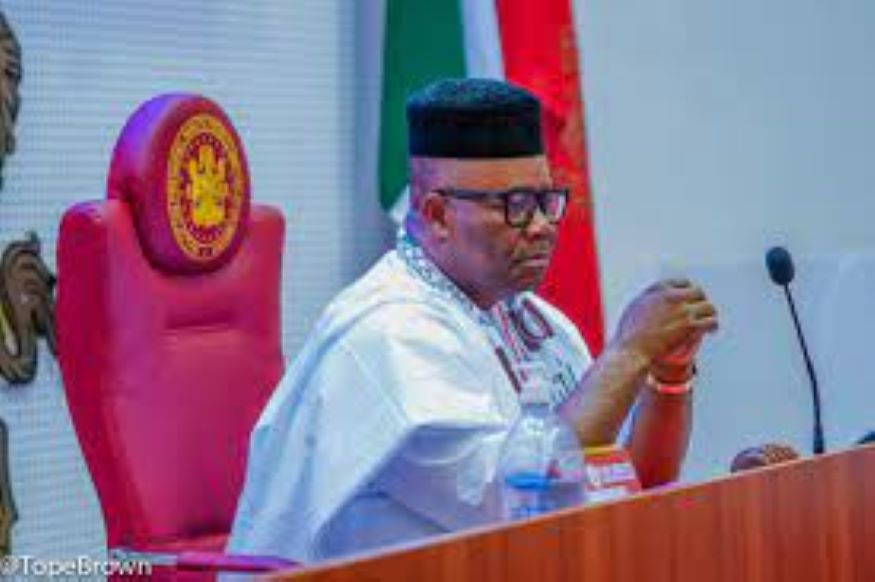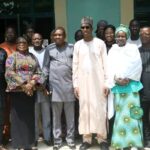*Sets up 7-man Ad-hoc Committee to investigate allegations
*As opinion got divided along ethnic, religious planks
By George Mgbeleke
The Senate on Wednesday at plenary revisited alleged uneven disbursement of intervention loans to the tune of N483 billion by development financial institutions within the six geo-political zones in the country.
This was as the upper chamber raised a 7-man an Ad- hoc Committee to investigate the matter and report to the Senate in four weeks for further legislative action.
Chairman of the Ad-hoc Committee is Sen. David Umahi.
Other members are Senators: Babangida Oseni, Ali Ndume, Sani Musa, Tokunbo Abiru, Ipalibo Banigo and Chizoba Chukwu.
This followed the debate of a motion by Sen. Ali Ndume (Borno South), which was supported by 64 other senators on the need to holistically investigate the disbursement of loans by Development Bank of Nigeria, NIRSAL and related banks to Micro, Small and Medium Scale Enterprises (MSMEs) in the country from 2015 to date.
Recalled the same motion by Ndume and three others was investigated by an Ad- hoc committee in the 9th Senate and a report submitted by the panel headed by Senator Sani Musa (Niger East).
Nothing else was heard thereafter.
Deliberating on the motion at plenary yesterday, the Senate noted the huge disparity and un-even distribution of half a billion Naira to states in the six geo-political zones and states in the country in 2021 by the Development Bank of Nigeria.
“Aware that the Bank’s Annual Integrated Statutory Report 2021obtained on 13th July, 2022 from the organisation’s website showed that the Bank disbursed a loan worth N483,000,000,000 out of which only 11 percent went to the 19 states of Northern Nigeria, while 47 percent went to Lagos State alone.
“Also aware that the 13 percent of the loan that went to the North totals about about N53,130,000,000, while the 47 percent that went to Lagos State alone totals N227,010,000,000.”
According to the breakdown of the loan presented by Ndume, “the South-West got 57 percent worth N274,740,000,000; South-South got 17 percent worth N81,940,000,000; North-Central got 11 percent worth N53,020,000,000; South-East got 9 percent worth N43,380,000,000; North-West got 5 percent worth N24,100,000,000; North-West and North-East got just one percent of the loan worth N4,820,000,000.”
Recall that the Development Bank of Nigeria exists to alleviate financing constraints being faced by Micro, Small and Medium Scale Enterprises (MSMEs) in Nigeria through providing finances, partial credit guarantees and technical assistance to eligible financial intermediaries on a market – conforming and fully financially sustainable basis.
Ndume also said that the top-five sectors considered for the loan were oil and gas (42.0 percent); manufacturing (16.0 percent); agriculture, forestry and fisheries (7 .2 percent); trade and commerce (6.3 percent); while transportation and storage got 3.5 percent.
However, there was mild drama as senators took time to dissect the motion.
Sen. Seriake Dickson (PDP Bayelsa), while suggesting an addition prayer asked that the Ad-hoc investigation should be extended to look at all intervention loans by the CBN, including Covid-19 palliative, Anchor Borrows loan, etc.
But the additional prayer was dropped on the pretext that it will make the assignment of the Ad- hoc committee unending.
Contributing earlier, Sen. Orji Uzir Kalu (Abia-North) said loans are secured upon application and following satisfying requisite requirements, including bank guarantees.
Sen. Olamilekan Adeola (Ogun-West) said Ndume had the notion that his North-East zone was short-changed but forgot that the development financial institutions had laid down procedures for the disbursement of the loans, but appealed that the motion be given a second look if Ndume felt bad about the facts.
Sen. Sani Musa (Niger-East) who headed the former Ad- hoc committee said it should be noted that there is difference between bank loans and palliatives.
While agreeing that development institutions has criteria for granting loans, he said the institutions might not be strictly followed .
He disclosed that 65 percent of loans disbursed by DBN has been repaid.
Musa also said the interests of northerners in applying for the loan may be restricted by religious belief that no interest should be paid on.loans while financial institutions take 17 percent on loan.
But Ndume interjected saying he perfectly understood workings of development institutions and their requirements, but claimed he got information presented from the website of the DBN and microfinance institutions involved.
A financial expert and retired banker, Sen. Isah Jibril advised that the DBN among other institution is not wholly Nigerian institution but has foreign bodies like the World Bank and International Monetary Fund (IMF) as investment partners and they have their criteria which cannot be compromised by the Nigerian system.
He advised that Nigerians that failed to meet such requirement should approach other less cumbersome institutions such as the Bank of Industry and Bank of Agriculture.



